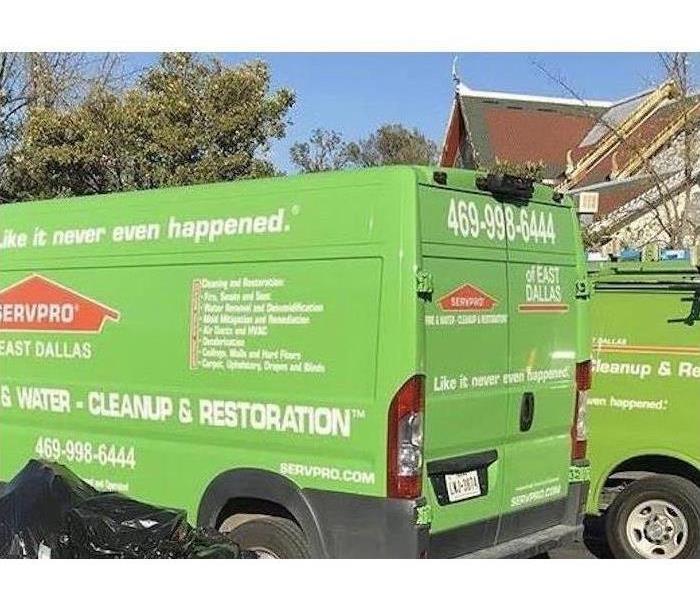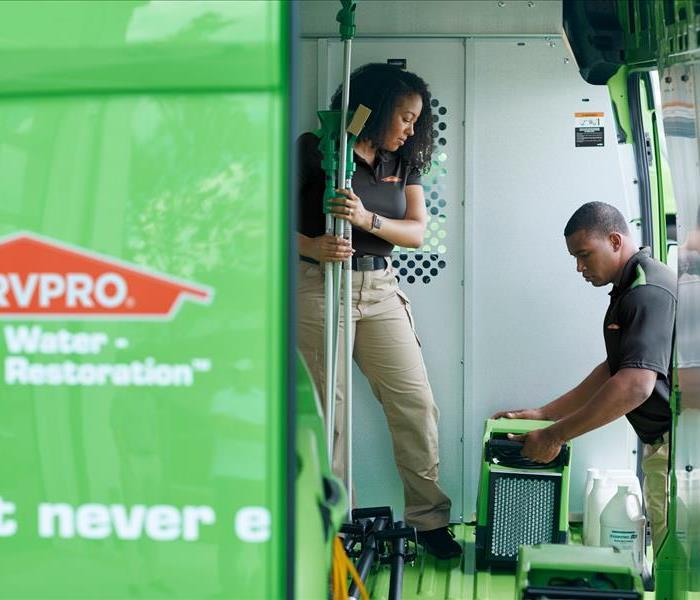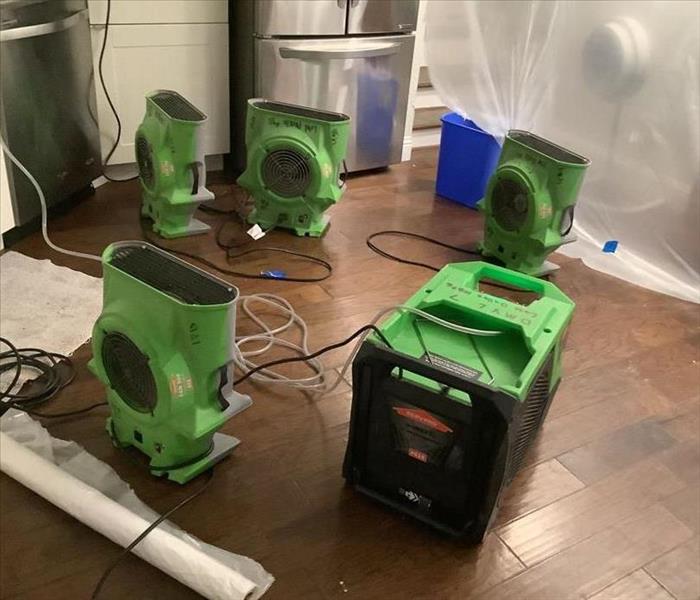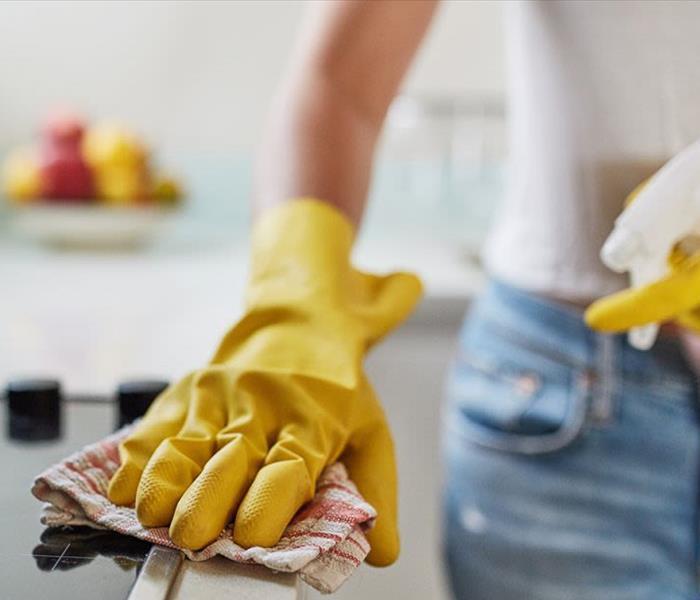When to Call Your Local Plumber
12/27/2023 (Permalink)
 SERVPRO of East Dallas has been serving all of Dallas for years!
SERVPRO of East Dallas has been serving all of Dallas for years!
Calling a plumber is necessary in various situations where you encounter plumbing issues that you may not be able to handle on your own. Here are some common scenarios when it's advisable to call a plumber:
Leaks:
- Visible Water Leaks: If you notice water leaking from pipes, fixtures, or appliances, it's important to address the issue promptly. Water leaks can lead to water damage, mold growth, and increased utility bills.
- Hidden Leaks: If you suspect a hidden leak (e.g., water stains on walls or ceilings, unexplained increases in water bills), a plumber can use specialized equipment to identify and repair the source.
Clogs:
- Persistent Drain Clogs: If plunging or using chemical drain cleaners doesn't resolve a stubborn clog, a plumber can use professional tools like a drain snake or hydro-jetting to clear the blockage effectively.
- Multiple Clogged Fixtures: If multiple fixtures are clogged simultaneously (e.g., sinks, toilets, and showers), it could indicate a more significant issue within the main sewer line.
Low Water Pressure:
- Sudden Drop in Water Pressure: A sudden decrease in water pressure throughout the house may be a sign of a plumbing issue. A plumber can diagnose and address the cause, whether it's a clog, pipe damage, or a faulty pressure regulator.
No Hot Water:
- Water Heater Issues: If your water heater is not producing hot water or if you notice unusual noises, leaks, or rusty water, it's time to call a plumber. Water heater problems require specialized knowledge for diagnosis and repair.
Burst or Frozen Pipes:
- Burst Pipes: In the event of a burst pipe, shut off the water supply immediately and call a plumber. Burst pipes can cause extensive water damage and require professional repair.
- Frozen Pipes: If you suspect your pipes are frozen, it's crucial to address the issue promptly to prevent bursting. A plumber can assess the situation and thaw the pipes safely.
Installation of New Fixtures:
- New Appliance or Fixture Installation: When installing new plumbing fixtures, appliances, or making significant renovations, a plumber can ensure proper installation, adherence to local codes, and optimal functionality.
Sewer Line Issues:
- Foul Odors or Sewage Backups: If you notice foul odors, gurgling sounds, or sewage backups in drains, it may indicate a problem with the sewer line. A plumber can perform a camera inspection to diagnose and repair issues within the sewer line.
Water Quality Concerns:
- Discolored or Foul-Smelling Water: Changes in water color, taste, or smell could indicate issues with your plumbing or water supply. A plumber can investigate the cause and recommend appropriate solutions.
Gas Line Issues:
- Gas Leaks: If you suspect a gas leak, evacuate the premises immediately and call your gas company. Once the gas company has addressed the immediate danger, a plumber can repair the gas line.
In general, if you are uncertain about how to handle a plumbing issue, it's advisable to consult a professional plumber. Attempting DIY repairs without the necessary expertise can lead to further damage and potentially costly repairs. A licensed plumber has the knowledge and experience to diagnose and resolve a wide range of plumbing issues efficiently and safely.
SERVPRO of East Dallas: Top Cleaning Tips!
12/15/2023 (Permalink)
 Trust SERVPRO of East Dallas for your next clean!
Trust SERVPRO of East Dallas for your next clean!
At SERVPRO we know a couple of things about general cleaning! Here are some quick tips to get you ready.
Create a Cleaning Schedule: Maintaining a cleaning schedule is key to keeping your home consistently tidy. Break down tasks into daily, weekly, and monthly chores. This way, you'll stay on top of cleaning without feeling overwhelmed.
Declutter Before You Clean: Before diving into the actual cleaning process, take some time to declutter. Clearing away unnecessary items not only makes cleaning more efficient but also contributes to a more organized and visually appealing space.
Gather the Right Cleaning Supplies: Ensure you have the right tools for the job. Basic cleaning supplies include all-purpose cleaner, microfiber cloths, sponges, a mop, a vacuum cleaner, and garbage bags. Having the proper equipment makes the cleaning process smoother and more effective.
Start from the Top: When cleaning a room, begin at the highest point and work your way down. Dusting and cleaning high surfaces first will prevent you from having to re-clean lower areas.
Focus on High-Traffic Areas: Pay extra attention to high-traffic areas like entryways, kitchens, and bathrooms. These spaces tend to accumulate more dirt and grime, so regular cleaning is crucial to maintaining a clean home.
Cleaning is FUN! Sometimes.
7/25/2023 (Permalink)
 SERVPRO here to help with all your cleaning needs.
SERVPRO here to help with all your cleaning needs.
Cleaning can be a daunting task, but with the right tips and approach, it becomes much easier. Here are some general cleaning tips to help you keep your living spaces tidy and organized:
Create a cleaning schedule: Develop a regular cleaning routine to tackle different areas of your home on specific days. This prevents the buildup of dirt and grime and keeps your space consistently clean.
Declutter before cleaning: Before you start cleaning, declutter the area first. Get rid of items you no longer need or use to make the cleaning process more manageable and efficient.
Gather your cleaning supplies: Make sure you have all the necessary cleaning supplies and tools before you start. This includes microfiber cloths, cleaning solutions, a mop, a vacuum cleaner, a broom, etc.
Use microfiber cloths: Microfiber cloths are highly effective for cleaning surfaces, as they can trap dust and dirt without the need for additional cleaning chemicals.
Clean from top to bottom: When cleaning a room, start from the top (e.g., dusting ceiling fans, wiping countertops) and work your way down (e.g., vacuuming the floor). This prevents dirt and dust from falling onto already cleaned areas.
Use natural cleaning solutions: If possible, opt for natural cleaning solutions like vinegar, baking soda, and lemon juice. They are environmentally friendly and can be just as effective as commercial cleaning products.
Let cleaning solutions sit: For tough stains and grime, allow your cleaning solution to sit for a few minutes before scrubbing. This will help break down the dirt, making it easier to clean.
Don't forget high-touch areas: Pay special attention to high-touch areas like doorknobs, light switches, and remote controls, as they tend to harbor germs and bacteria.
Wash cleaning tools: Regularly wash cleaning tools like mop heads, vacuum cleaner filters, and scrub brushes to prevent the spread of dirt and germs.
Maintain the cleanliness of your cleaning tools: Rinse and clean your cleaning tools after each use to keep them effective and in good condition.
Vacuum regularly: Vacuum high-traffic areas and carpets at least once a week to keep dust and dirt at bay.
Keep a doormat: Place a doormat at the entrance of your home to reduce the amount of dirt and debris brought in from outside.
Involve the family: Get everyone in the household involved in cleaning chores to make the process faster and more manageable.
Reward yourself: After completing your cleaning tasks, reward yourself with something enjoyable. This positive reinforcement can make cleaning feel less like a chore.
Remember, cleaning is not a one-time job, and maintaining a clean and tidy space requires consistent effort. With these tips and a proactive approach, you can keep your home looking neat and organized.
Dallas General Cleaning Tips for Homeowners and Business Owners
3/13/2023 (Permalink)
 Cleaning is important for health and mind!
Cleaning is important for health and mind!
SERVPRO of East Dallas rounded up our top tips for all homeowners and business owners to keep their surroundings clean and tidy.
Establish a regular cleaning routine: Set aside time each week to clean your home. By establishing a routine, you can stay on top of the cleaning and prevent clutter and dirt from building up.
Declutter regularly: Clutter can make your home appear messy and unorganized. Regularly go through your belongings and get rid of anything that you no longer need or use.
Use the right cleaning products: Different surfaces and materials require different cleaning products. Be sure to use the appropriate cleaning products for each surface in your home to avoid damage.
Use microfiber cloths: Microfiber cloths are highly effective at picking up dust and dirt. They are also reusable and environmentally friendly.
Clean from top to bottom: When cleaning a room, start from the top and work your way down. This ensures that any dirt or dust that falls will be cleaned up during the process.
Don't forget about hard-to-reach areas: Areas such as baseboards, window sills, and ceiling fans can often be overlooked during cleaning. Be sure to include these areas in your regular cleaning routine.
Use natural cleaning products: Natural cleaning products are often safer and more environmentally friendly than harsh chemical cleaners. Consider using natural alternatives such as vinegar, baking soda, and lemon juice.
Don't neglect your appliances: Appliances such as your refrigerator, oven, and dishwasher need regular cleaning to function properly. Be sure to include these appliances in your cleaning routine.
Clean as you go: It's easier to clean up messes as they happen rather than waiting until they become more difficult to clean. Clean up spills and messes as soon as they occur.
By following these tips, you can keep your home clean and organized, making it a more pleasant and healthy environment to live in.






 24/7 Emergency Service
24/7 Emergency Service



